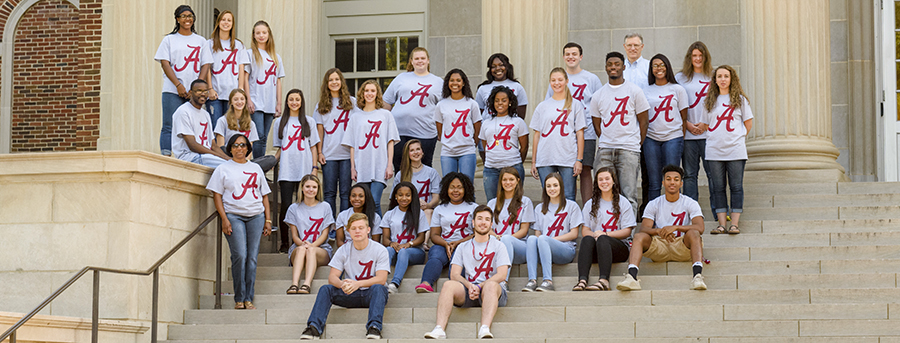May 28–June 28, 2017
The University of Alabama’s Rural Programs recently hosted the 2017 Rural Health Scholars and Rural Minority Health Scholars annual summer programs, each comprised of select high-school-age students interested in pursuing medical and health care careers in rural Alabama. Part of the Rural Health Leaders Pipeline, each program ran for five weeks and offered on-campus living, college courses, field trips and seminars as an orientation for students as to what they might expect as they prepare to enter college.
The premise of the Rural Health Leaders Pipeline is that rural students trained in the medical field will be more likely to return and practice in their rural communities, thereby continuing the College of Community Health Sciences mission to improve and promote the health of individuals and communities in Alabama. In point, the College’s founding Dean William R. Willard posited that successful rural medical education in Alabama would, and should, begin with rural high school students.
Noteworthy this year is the celebration of the 25th class of Rural Health Scholars. The Rural Health Scholars program is an integral component of the Rural Health Leaders Pipeline because it serves as a way to recruit students from rural communities, with the goal of improving the production of rural health care professionals. Such is also true for the Rural Minority Health Scholars program, a spin-off of the Rural Health Scholars program initiated specifically to increase the number of minority students from rural Alabama who qualify for medical school and to provide opportunities for underserved populations and communities in the state.
The Rural Health Scholars program was a life-changing experience for me as a 16-year old girl growing up in rural Alabama. No one in my family was involved in the health care field, so it was my first exposure to medicine. The summer experience opened my eyes and gave me the confidence that I needed to continue down the path to become a doctor…without that experience I doubt I would have ever considered the medical profession. The state of Alabama healthcare is no doubt better because of the influence of this program.

Taken as part of the whole, these programs provide accessibility and support to rural students as they pursue future careers in the medical field. “It’s about the transitions that rural kids face as they near the end of high school, what looms before them,” said Dr. John Wheat, Director of Rural Programs. “The overarching hope is to offer opportunities for students to enter fields which they might otherwise have little access in their small communities.”
Learn about the Rural Health Leaders Pipelines and its affiliated programs.
2017 Rural Health Scholars
- Mason Alexander Aldridge
- Jessica Leanne Aplin
- Annelise Grace Baker
- JaKailyn Barnes
- Keltanishaline Bates
- Will David Bobbs
- Shelby Gillis Juanita Boswell
- Morgan Ashley Campbell
- Makayla Ryann Coleman
- Kayla Michelle Creighton
- Rachael Ngozi Dike
- Rebekah Chidinma Dike
- Emmanuel James King
- DaVonyae Lashae Miller
- Lauren Katherine Moore
- Jagger Dylan Morgan
- Ivy Gabrielle Murphy
- Ora Jocelyn Nelson
- Emma Abigail Phillips
- Joshua Kyle Raney
- Lauren Destiny Shepherd
- Taylor Elaine Skipper
- Kaitlin Elida Truslow
- Jakeira Shardell Washington
- Shiann Nicole Weaver
2017 Rural Minority Health Scholars
- Tomysha Danielle Boykin
- Logan Aricie Broxton
- Christopher Everett Daffin Jr.
- Keyonna Dixon
- Imberly Iesha Flowers
- De’Larrian DeAnte’ Knight
- Ciara Dawn Locke
- Scott Nguyen
- Jessica Brianna Richardson
- Hillary Denise Strong
- Garian Lucene Ware
